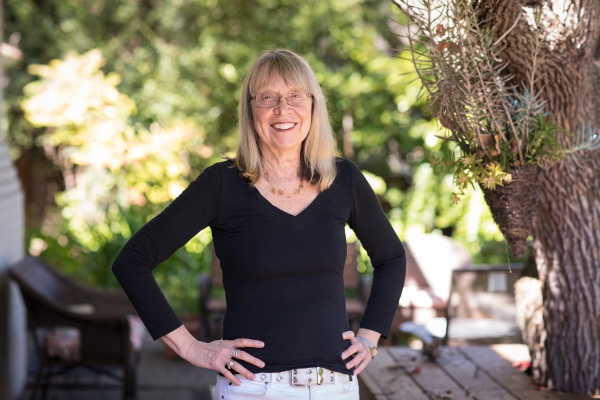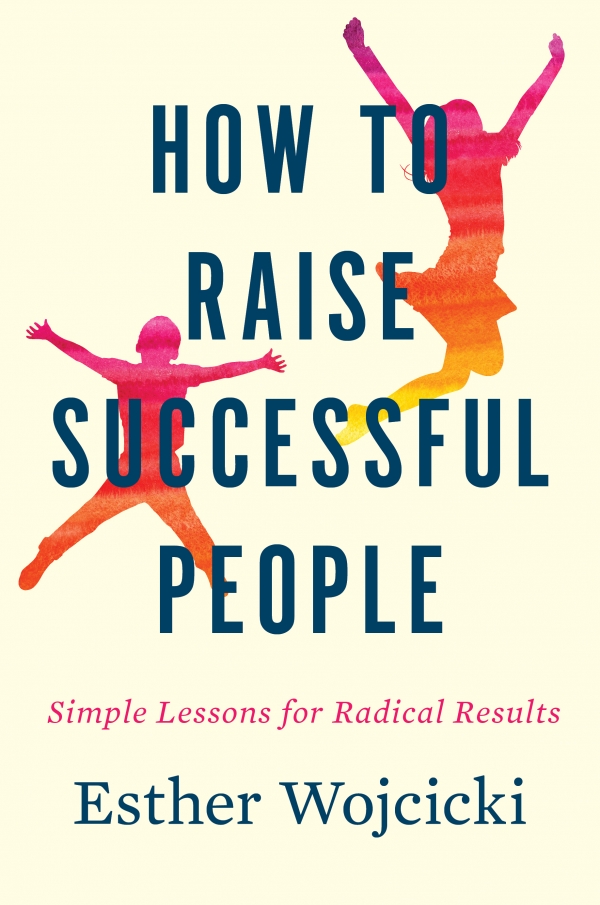Esther Wojcicki, Palo Alto High School's award-winning journalism teacher who founded the Paly Media Arts program and gained international recognition in 2015 after releasing "Moonshots in Education: Launching Blended Learning in the Classroom" -- an instruction manual for refocusing education to teach young people how to think -- released a new "how to" book on May 7. This time around, the Palo Alto mother looks at how parents can impact children outside of the classroom.
In "How to Raise Successful People: Simple lessons for radical results," Wojcicki shares the principles she used to raise three notable daughters, all of whom rose to the top of competitive, male-dominated professions. Wojcicki is the mother of Susan Wojcicki, who is the CEO of YouTube; Anne Wojcicki, who is the CEO of 23andMe; and Janet Wojcicki, who is a professor of pediatrics at the University of California, San Francisco.
Wojcicki, known as "Woj" among her students at Paly, said people kept asking her what she did to raise such successful children, so she decided to write a book about it.
"I've spent a lifetime collecting this information, and I thought I would make it easy and share it with everyone," she said.
The key to raising happy and successful children, she explains in the book, is a method she developed called TRICK, an acronym for trust, respect, independence, collaboration and kindness. The lessons are simple, but the results are radical.
Wojcicki will talk about her book at Palo Alto High at 7 p.m., Wednesday, May 22, during a special event co-hosted by Books Inc. and the school.
Wojcicki's methods are the opposite of helicopter parenting, which she said has become epidemic.
"Stress levels are going up, not down," she said. "Parents need to relax. Their kids are much more capable and sensible than they think. They are going to be OK. The key is trust ... trusting your child. When you trust your child, they feel good about themselves and they trust themselves."
Wojcicki said she doesn't want to discourage parents from arranging afterschool activities but suggests cutting back on their number.
A lot of those kids can hardly do anything on their own because they are so pre-programmed, she said.
She advises parents to let their children lead, something she did with her own children from an early age, and emphasizes the importance of eliciting curiosity in children by encouraging them to ask the right questions.
"I didn't buy my kids all those toys that did things for you. I gave them a lot of freedom to come up with their own idea of what to play," she said. "My kids were busy doing things like using blankets from the closet to make forts. They didn't have any Barbie dolls, but they had a lot of stuffed animals, and their stuffed animals always had adventures. The house was sort of a mess, sorry to say, but you know, they were having fun coming up with ideas."
Wojcicki said that when parents support curiosity, what they're really developing is a child's imagination.
Wojcicki's three daughters attribute much of their ability to thrive during the ups and downs of life to the way their parents raised them.
"We don't remember ever having our ideas or thoughts dismissed because we were children," they wrote in the foreword of the book. "At every age, our parents listened and acted like it was a two-way street for learning. We learned to advocate for ourselves, to listen and to realize when we might be wrong."
"We argued, but we didn't fight," Anne added.
Wojcicki said the impetus for raising her children to be independent thinkers happened when she was 10. Her 16-month-old brother, David, was playing on the kitchen floor and came across a bottle of aspirin that he thought was a toy. He ended up swallowing dozens of pills. Her mother immediately called the doctor, who told her to put him to bed and check him in a few hours. Her mother did exactly what she was told, but David got worse. Her mother, a poor Russian immigrant, drove him to hospital after hospital but was turned away, and David died before he could be treated.
"My mom was unsure of herself and didn't trust her instincts," Wojcicki said. "I decided not to trust people with long titles and began to ask 'why' and challenge the system. ... This made me an independent thinker."
Wojcicki said never pushed her children but showed them how to make their own choices.
"I couldn't control what happened to them in life, but I could give them this tool to think no matter what happens to them in life, and that's all I wanted to do. I didn't want to have a repeat of what my mother suffered because she never recovered from that tragedy."
Tickets for the May 22 event are $35 and include a copy of "How to Raise Successful People." A portion of all ticket sales benefits Paly. More information is available at booksinc.net.




Comments
Adobe-Meadow
on May 19, 2019 at 11:40 am
on May 19, 2019 at 11:40 am
In my view, Ms. Wojcicki used her position as a journalism adviser to attempt to save her colleague's job through smearing a 14 year old student, while using unwitting students and a tax payer financed student publication to do it. This is called abuse of power. And so we should listen to her?
And was that student one of color and of low income?
Adobe-Meadow
on May 19, 2019 at 11:51 am
on May 19, 2019 at 11:51 am
Btw - her daughter's company, 23andme, has been called out for false results: Web Link
And the one at the head of YouTube, planned to change the algorithm for YouTube search results, which would have put Alex Jones and Infowars in the top results. The head of google had to nix her plan. Web Link
Barron Park
on May 19, 2019 at 12:24 pm
on May 19, 2019 at 12:24 pm
Reality check please:
Ms. Wojcicki's daughter's company 23andme was recently in the NYTimes: "Don’t Count on 23andMe to Detect Most Breast Cancer Risks, Study Warns" Web Link
Here's an excerpt - which discusses the false hope 23andme gave to one of its customers, which may have impacted the medical care the patient pursued:
In 2010, Dr. Pamela Munster mailed her saliva to 23andMe, a relatively new DNA testing company, and later opted in for a BRCA test. As an oncologist, she knew a mutation of this gene would put her at high risk for breast and ovarian cancer. She was relieved by the negative result.
Two years later, after she learned she had breast cancer, she took a more complete genetic test from a different lab. This time it was positive.
A study of 100,000 people released earlier this month suggested that this experience could be widespread. Nearly 90 percent of participants who carried a BRCA mutation would have been missed by 23andMe’s test, geneticists found.
Is 23andme's advertising about its tests deceptive? How many people have been impacted?
Again, an exerpt:
“The F.D.A. should not have permitted this out-of-date approach to be used for medical purposes,” Dr. King said. “Misleading, falsely reassuring results from their incomplete testing can cost women’s lives.”
Downtown North
on May 19, 2019 at 3:24 pm
on May 19, 2019 at 3:24 pm
What if Fox News attacked Christine Blasey Ford's account of her alleged encounter with Brett Kavanaugh, stating without any evidence that the incident was consensual --- except for one lone, unverified statement by Kavanaugh's lawyer and some info from someone trying to save their skin? And what if Fox News ignored evidence of Brett Kavanaugh's prior record of sexual misconduct and instead repeatedly reported that the incident between Blasey Ford and Kavanaugh was consensual, while failing to mention that Blasey Ford claimed sexual assault?
Well, isn't that what the student publication that Esther Wojcicki advises did to a 14 year old student while reporting on the Paly Oct. 2016 incident?
And so we should listen to her?